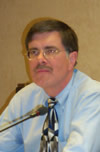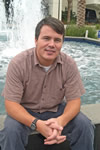Climate Change: What It Means, What to Do
Student and Faculty Researchers Discuss Issue During Two-Day Symposium
April 15, 2008
By Russ L. Hudson
Global climate change will be viewed from several angles April 15 and 16 during the College of Natural Sciences and Mathematics' Inter-Club Council Symposium in the Titan Student Union.
"The Science of Climate Change: What Have We Done? What Can We Expect?" is the title of the 1 p.m. April 15 keynote address by Michael Prather, an internationally known atmospheric chemist from UC Irvine's Department of Earth Systems Science.

Michael Prather
"The Earth's climate is now clearly out of balance and is warming," said Prather. "Many components of the climate system, including the temperatures of the atmosphere, land and ocean; the extent of sea ice and mountain glaciers; the sea level; the distribution of precipitation; and the length of seasons, are now changing at rates and in patterns that are not natural.
"They are best explained," he said, "by the increased atmospheric abundances of greenhouse gases and aerosols caused by human activities during the 20th century.
"What can we do?" Prather asked, pointing out that the cause of disruptive climate change is tied to energy use and runs through modern society. "Some people will argue for sustainable energy, others for geo-engineering or similar technological solutions, and others for just adapting to the new climate. Solutions will necessarily involve all of us."

Michael Horn
"Climate Change in the North Pacific: A Complex Challenge for Sustainability?" is the subject of a 10 a.m. talk by Michael H. Horn, professor of biological science whose research focuses on sea life and sea birds, as well as conservation biology.
"Ocean temperatures continue to increase, but short-term climatic events, such as the current La Niña episode, complicate the picture," Horn said. Other factors, he added, particularly overexploitation and habitat damage, also add to the challenge of predicting and adapting to climate change in the North Pacific.
"Increasing attention to this complex situation holds promise for greater understanding and bolder solutions," he said.

Matthew Kirby
Paleoclimatologist Matthew E. Kirby, assistant professor of geological sciences, will address "Establishing a Baseline of Past Hydrologic Variability in Southern California for Better Water Management Practices?" at 11:30 a.m.
Kirby, with National Science Foundation support, is tracking long-term weather patterns in Southern California by taking deep core samples from the bottom of Lake Elsinore to "read" the layers of sediment washed in by precipitation since the last ice age. The purpose is to establish a baseline of precipitation and weather patterns so water can be better managed in this part of the state.
"The weather is getting steadily drier," Kirby said. "The evidence from Lake Elsinore, and from studies of other Southern California lakes, clearly shows that. Human activity has an effect, too. The weather changes are apparent, and what has been washed into the lake has changed as more and more people have arrived."
All three talks will be held in the Titan Theater of the Titan Student Union.
From 9 a.m. to 4 p.m. April 16, student researchers will be available to answer questions about their research posters and research endeavors in the Titan Student Union's Portola Pavilion.
Among the variety of student research are how populations of certain animals in the Mojave Desert recover after a fire, the feeding preferences of certain sea creatures, muscle development in yellowfin tuna, how proteins make starch, whether a ban on vegetation sold for aquariums is helping to save the natural vegetation in the sea and understanding how certain enzymes affect biosynthesis of useful starches.
For more information, call Rochelle Woods, assistant dean of the College of Natural Sciences and Mathematics, at 278-4158 or rwoods@fullerton.edu.
